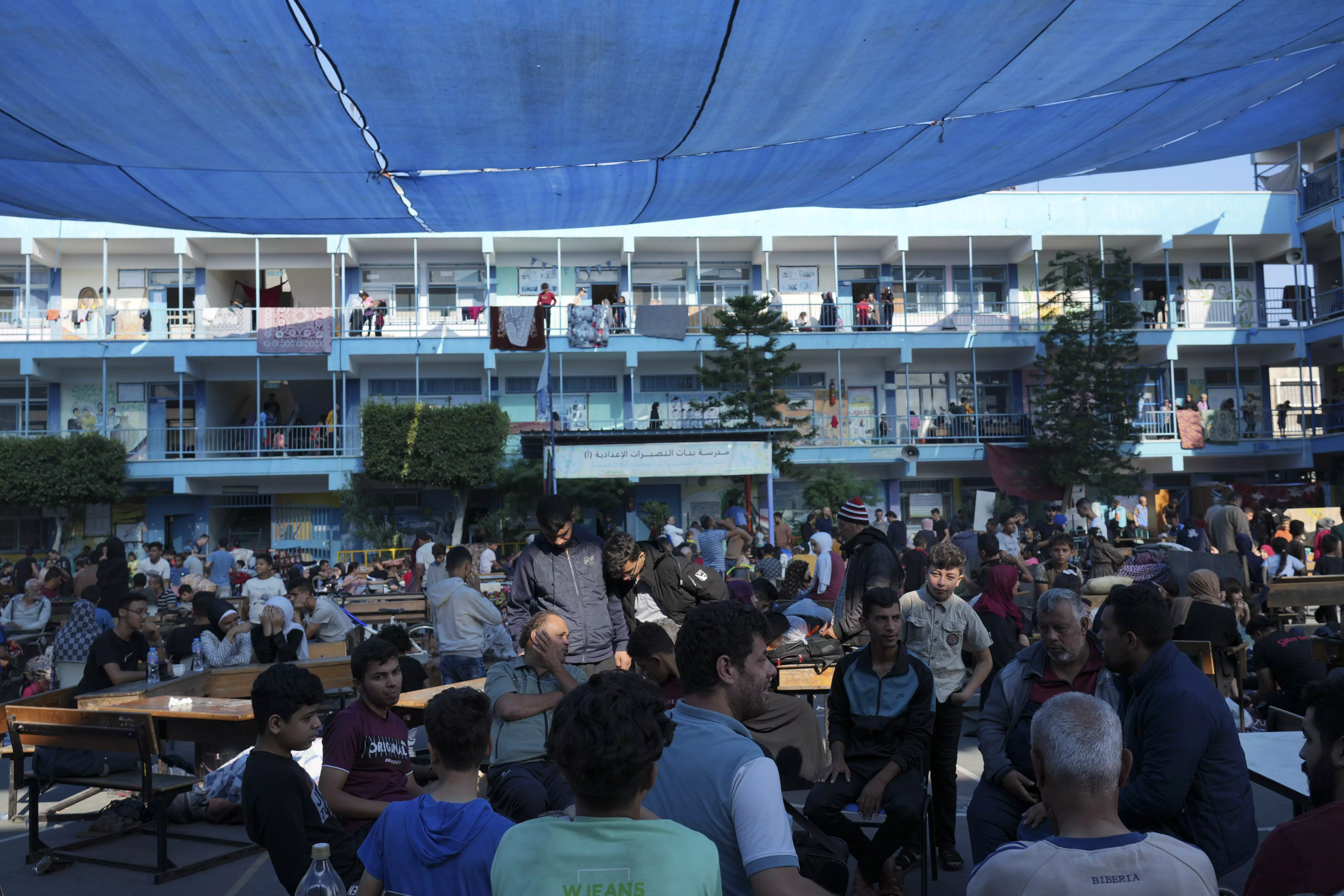
Gaza's crowded hospitals, schools near breaking point as Israeli ground invasion looms
Trucks carrying badly-needed aid have been waiting for days at the Rafah crossing as mediators press for a truce that would let them enter Gaza and allow foreigners to leave

Palestinians in besieged Gaza crowded into hospitals and schools on Monday (October 16) seeking shelter ahead of an Israeli military invasion as the thickly-populated strip ran low on food and water.
More than a million people have fled their homes following Israeli warnings ahead of an expected Israeli ground invasion aimed at destroying Hamas which killed 1,400 Israelis on October 7.
Israeli forces, supported by a growing deployment of US warships in the region and the call-up of some 360,000 reservists, have positioned themselves along Gaza's border and drilled for what Israel said would be a broad campaign to dismantle the militant group.
As Gaza's food, water and medicine supplies dwindled, all eyes were on the Rafah crossing between Gaza and Egypt.
Trucks carrying badly needed aid have been waiting for days at the crossing as mediators press for a truce that would let them enter Gaza and allow foreigners to leave.
Rafah, Gaza's only connection to Egypt, was shut down nearly a week ago because of Israeli airstrikes.
Water rationing
Amid UN warnings of a humanitarian catastrophe, hundreds of thousands of Palestinians are on less than one liter of water per day.
Hospitals warn they are on the verge of collapse, with emergency generators that power machines like ventilators and incubators down to about one day of fuel. Supplies of medicine are almost exhausted.
The Gaza Health Ministry said 2,750 Palestinians have been killed and 9,700 wounded since the fighting erupted, making this the deadliest of the five Gaza wars for both sides.
More than 1,400 Israelis have died, the vast majority civilians killed in Hamas' October 7 assault.
The Israeli military said on Monday that at least 199 hostages were taken back in Gaza, higher than previous estimates. The military did not specify whether that number includes foreigners.
Israeli airstrikes have pulverized entire neighbourhoods as Palestinian militants continue to fire rockets into Israel.
Israeli plans
Israel is widely expected to launch a ground offensive in order to kill Hamas leaders, recover captives and destroy the group's military infrastructure, much of which is in residential areas.
Street-by-street fighting would likely cause mounting casualties on both sides, military experts say.
The Israeli military says it is trying to clear away civilians ahead of a major campaign against Hamas in the north, where it says the militants have extensive networks of tunnels and rocket launchers. Hamas has urged people to stay in their homes.
For a third day, Israel's military announced a safe corridor for people to move from north to south between the hours of 8 a.m. and noon. It said more than 600,000 people have already evacuated Gaza City.
The World Health Organisation said hospitals are “overflowing” as people seek safety. "We are concerned about disease outbreaks due to mass displacement and poor water and sanitation,” it said.
Four hospitals in northern Gaza are no longer functioning and 21 have received Israeli orders to evacuate. Doctors have refused, saying it would mean death for critically ill patients and newborns on ventilators.
Humanitarian disaster
The WHO said water shortages caused by Israel's decision to cut off water supplies, combined with a lack of fuel for pumps and desalination stations, put thousands of hospital patients at risk.
Travel within Gaza is difficult and dangerous, with roads destroyed and Israel offering only short windows for civilians to travel without the threat of strikes.
The UN agency for Palestinian refugees said it has been forced to ration water in schools and other facilities that have been turned into shelters, giving people just one litre a day to cover all their needs.
Israel has said the siege won't be lifted until Hamas releases all the captives, but the country's water ministry said water had been restored at one “specific point” in Gaza.
Meanwhile, the Israeli military ordered residents to evacuate 28 communities near the Lebanese border after increasing cross-border fire between Israel and the Lebanese militant group Hezbollah.
A military spokesman said the evacuation would allow Israeli forces to operate with greater latitude.
Lebanese front
“Israel is ready to operate on two fronts, and even more,” he said. "If Hezbollah makes the mistake of testing us, the response will be deadly.”
Hezbollah militants fired rockets and an anti-tank missile on Sunday, and Israel responded with airstrikes and shelling.
In the northern Israeli port city of Haifa, the US government began evacuating some 2,500 American citizens by ship to Cyprus.
(With inputs from agencies)

